I get a lot of pharmacy-related emails. Maybe 30-50 per day. Most are news briefs and articles on prescriptions, healthcare and trends. I consider it to be part of my job to try and stay current, recognizing that I inevitably cannot keep up with everything. At best I can scan the headlines and skim the articles that are most relevant to my current work or interest.
It was in the process of such skimming that I noticed a headline that caught my eye a few days ago: “Dietary supplements: mislabeled, contaminated and probably useless.” The headline linked to an online article from the New York Times which was titled, presumably by the authors, “Skip the Supplements.” It was written from the perspective of those working in a hospital who have to manage the challenge of patients (or parents) who want to continue using certain supplements while hospitalized, even though they have questionable value and carry the risks of inadequate manufacturing standards. They cite several well-known investigations of supplement companies who have failed to operate ethically, monitor carefully or report accurately their ingredients. These are serious concerns.
As a writer, I understand that no single article should be judged entirely on what it says. Editorial guidelines and space-limits inevitably mean that we often cannot present all the data and information we want. I’m not criticizing the authors themselves. However, I must confess that I’m concerned about the one-sided appearance of such articles. As we who were trained in healthcare science seek to present our criticisms of the supplement industry, we need to beware giving the impression that our own preferred methods of treatment are flawless or above reproach. At the risk of sounding cliché, those who live in glass houses shouldn’t throw stones.
The authors point out that “approximately 50,000 adverse reactions to dietary supplements occur every year.” That sounds like a lot. But compared to what? According to the same FDA, prescription medications could be responsible for up to 100,000 deaths per year. Deaths. Now, don’t misunderstand. I’m NOT suggesting that prescription medications are inherently evil. I use them and recommend them. All I am saying is this: let’s not try to exaggerate the dangers of unregulated supplements while ignoring the real risks associated with properly regulated and administered drugs.
The authors cite that 2 supplements were pulled off the market in 2008 due to excessive and dangerous selenium content. The authors do not mention the 1,742 drug recalls issued by the FDA in 2009.
The authors mention Purity First Health Products who had a problem with their vitamin B-50 product. They authors do not mention that this company has, as far as I could see, gone out of business….unlike most prescription drug companies who experience recalls, respond, and then just keep on pumping out more product.
I sincerely sympathize with the challenge that hospitals face when trying to accommodate the request to utilize OTC supplements by patients. I don’t think there is an easy answer, and the efforts made by the authors of the article were commendable as they sought to obtain supplements for patients from manufacturers utilizing reliable standards. But the catchy title accompanying my email “Dietary supplements: mislabeled, contaminated and probably useless” is, in my opinion, exaggerated at best. Are we, for example, ready to tell patients that they shouldn’t supplement with OTC vitamin B-12 if they are taking long-term acid suppression, even though a recently released JAMA article suggests this is a real concern? Is the “risk” of potentially getting a contaminated OTC supplement scientifically more than the risk associated with utilizing many approved prescription drugs?
I’m not happy that the manufacturing standards of OTC supplements are often inadequate to guarantee they contain the proper dose or ensure they are always contaminant-free. But I’m not happy with the multitude of side-effects (ever watch TV?) our beloved prescription drugs can also produce. I’m not happy that cars crash, lightning strikes and sick people sneeze germs into the air we all breath. We know there are risks associated with virtually everything we do. My opinion is that we simply need to treat the risks associated with supplements (especially the quality control aspects of manufacturing) the same way we manage other medication-related risks. Granted, some supplements have virtually no reliable evidence that they work at all. But most have some reasonable and possible benefits. Personally I’m not prepared to say, without qualification, “skip the supplements.” But that’s my opinion. What’s yours?
Last modified: April 17, 2023















